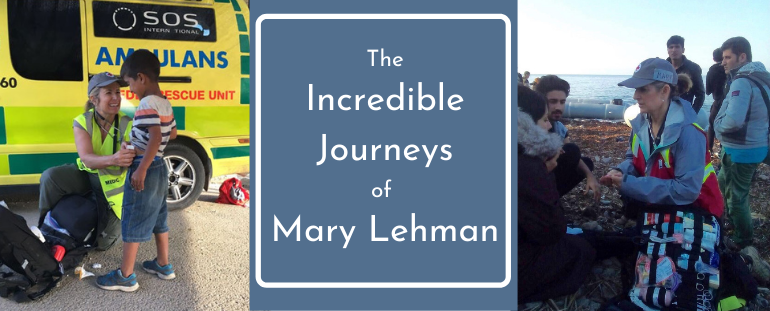
By Edward McIntyre
Thanksgiving 2015: Mary Lehman, appellate specialist, saw images of Syrian refugees arrivingby boat on Greek shores, homeless, cold, fleeing war and deadly reprisals. Young parents tossed their baby over a razor-wire fence to a volunteer to get the child out of the cold.
Mary, an EMT since college, grabbed her medical backpack, rushed to Greece, and volunteered as a medic on the beaches. The Red Cross hadn’t yet arrived, nor had Doctors Without Borders. Instead, individuals raced to help the 5,000 refugees arriving each day.
“It was super intense. Life changing. I showed up alone. But I knew I had to do it. The only cure? Keep doing it.”
She did. Three times. Twice as a medic and the third time as a lawyer. She’d met a legal support group while working as a medic. Returning as a lawyer, she learned a bit of asylum law and went to the island of Leros, taking a refugee with her to translate. The only lawyer, she started serving Syrian refugees. Mornings, she worked out of a small café; afternoons, from tables and chairs under a eucalyptus tree. She explained basic asylum law; for those who couldn’t read, she drew pictures.
With early aspirations of becoming a doctor, Mary first became an EMT. Shifting to law school and pursuing her career as an appellate lawyer, she remained an EMT. The first woman “hot shot” — medic on a fire crew — she’s still a medic on the Mammoth ski patrol. She’s volunteered as a medic in the Philippines and in Puerto Rico after a hurricane.
Thanksgiving 2018: When an early caravan traveled from Central America through Mexico seeking asylum in the United States, Mary, who speaks Spanish, crossed another frontier — to Tijuana. She hung out a sign with a red cross and “free medical care” and got started. At the same location was a table giving out asylum information.
McAllen, Texas 2018: Mary saw reports of asylum-seekers being dumped onto the streets of that border town — children with fevers because of the flu. She called a retired pediatrician in Chicago, whom she’d met volunteering in Greece, and told him they had to get to McAllen. By the next day, they did. They started providing medical care, mostly out of a small Catholic Charities clinic.
“It was traumatic. The kids were being kept in ‘the icebox.’ One was so sick with flu, we had to rush him to the hospital. Kids were dying of flu.”
Then Mary volunteered as a lawyer to interview parents in custody because only lawyers were allowed access.
Thanksgiving 2019: Back across the U.S.-Mexico border, this time to give asylum handouts to victims seeking refuge in the United States. Then, she volunteered with Al Otro Lado, helping asylum-seekers with applications. When U.S.-based lawyers representing asylum-seekers pro bono needed a lawyer to make Immigration Court appearances, Mary offered.
“I was right there. I didn’t know you had to be admitted before the Immigration Court. The clerk was nice. He admitted me the same day I showed up.”
That led to representing parents caught up in the family separation nightmare — giving up asylum claims thinking they’d be reunited with their children but weren’t.
“Asylum work is tough. Stressful. You hear the most traumatic stories. Women, children even, raped. I’m grateful to have the skills — to listen, to learn — to use them to be able to help society. It’s happening in our backyard. You come face-to-face with such suffering. You’ve just got to do it. I’m a better listener for it. It’s been a good journey for me.”
Edward McIntyre (edmcintyre@ethicsguru.law) is a professional responsibility lawyer and co-editor of San Diego Lawyer.